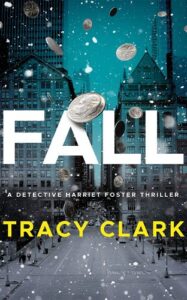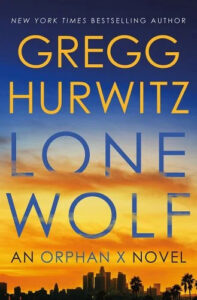Tracy Clark is the two-time Sue Grafton Memorial Award-winning author of the highly acclaimed Chicago Mystery Series featuring ex-homicide cop turned PI Cassandra Raines. The protagonist is a hard-driving, Black private investigator who works the streets of the Windy City while dodging cops, cons, and killers.
Gregg Hurwitz is the New York Times, #1 internationally bestselling author of 24 thrillers, including the Orphan X series, and two award-winning thriller novels for teens. Currently, Gregg is actively working against polarization in politics and culture. To that end, he’s produced several hundred commercials which got over a hundred million views on digital TV platforms. His editorial pieces have appeared in The Wall Street Journal, The Guardian, The Huffington Post, The Bulwark, and others.
Thanks so much to both of these wonderful writers for allowing us to run the following interview, in which they discuss a wide range of thoughtful approaches to the genre.
Gregg Hurwitz: Tracy, congratulations on launching your second book in the Detective Harriet Foster series. Readers have really been responding well to Harriet—and for good reason. What can they expect from FALL?
 Tracy Clark: Well, let’s just say that Det. Harriet Foster gets no downtime in FALL. Book 2 takes up just two weeks after the end of Book 1, HIDE. That’s how it works for real cops, so I try to replicate the constant go-go-go for my book cops. There’s usually not a lot of breathing room between cases. Crime never sleeps, right? In FALL, Harriet and her coworkers, her partner, Det. Vera Li, and the team–Symansky, Bigelow, Kelley, and the boss, Sgt. Griffin–are all back. This time out they are trying to solve the murders of aldermen in the city. Someone’s killing them and leaving behind 30 dimes (30 pieces of silver, a betrayer’s payment) on their bodies. The deaths are connected, but the team can’t figure out how for the longest time. But hard work pays off in the end. We also get more information on the subplot that’s been running through the series so far–the death of Harri’s first partner, Det. Glynnis Thompson. Things are not always what they seem.
Tracy Clark: Well, let’s just say that Det. Harriet Foster gets no downtime in FALL. Book 2 takes up just two weeks after the end of Book 1, HIDE. That’s how it works for real cops, so I try to replicate the constant go-go-go for my book cops. There’s usually not a lot of breathing room between cases. Crime never sleeps, right? In FALL, Harriet and her coworkers, her partner, Det. Vera Li, and the team–Symansky, Bigelow, Kelley, and the boss, Sgt. Griffin–are all back. This time out they are trying to solve the murders of aldermen in the city. Someone’s killing them and leaving behind 30 dimes (30 pieces of silver, a betrayer’s payment) on their bodies. The deaths are connected, but the team can’t figure out how for the longest time. But hard work pays off in the end. We also get more information on the subplot that’s been running through the series so far–the death of Harri’s first partner, Det. Glynnis Thompson. Things are not always what they seem.
Gregg Hurwitz: You paint Chicago politics quite well, with an insider’s eye, as well as the challenges facing law enforcement in the city. One of the lines from your book is: “This is Chicago. You’ll have an easier time counting the politicians who haven’t gone to prison than counting the ones that have.” When you were researching, what hit you strongest?
Tracy Clark: I would love to say that I did a lot of painstaking research, but honestly, my take on Chicago and Chicago politics comes from living in the city my whole life and having a pretty good sense of how The City That Works actually works. On paper, the powers that be will tell you there’s no such thing as The Chicago Machine, that City Hall and the City Council are pristine bastions of fairness and efficiency. That everyone in politics here has a heart of gold and only the best intentions. And then you pick up the newspaper in the morning and find out your alderman is on her way to prison for accepting an envelope full of money slipped under the table. We’re not the only big city with corruption problems, but I kinda think we’re a city that really commits to it. Everybody in Chicago has an alderman story. I just put mine in a book and added some razzle dazzle to it.
Gregg Hurwitz: How does your relationship with the Windy City shape your stories?
Tracy Clark: It’s everything. The city is a fully formed character in all my books. I don’t think you can live in a place and write about a place and not have that place and your experience with it seep out onto the page in a pretty intimate way. When I write about a neighborhood or a street corner or an underpass, I know it. I’ve been there. I’ve walked it. I know how it smells. I know whether there are rats scurrying around. I love Chicago. There are wonderful people here. The neighborhoods are unique and vibrant. It’s home and the food is great.
Gregg Hurwitz: I’ve heard that police officers have come to your events to shake your hand and congratulate you on how accurately Harriet’s professional world is portrayed. It’s always wonderful to get props from the real deal. I’m pretty sure you’ve never been a cop so how did you manage to write their world so authentically?
Tracy Clark: Yes, that’s happened a few times now and each time it does it makes me feel great. I didn’t want to write a cookie-cutter cop; I wanted to write real ones (or as real as I could make them). I wanted to write characters that if they were really real you might see them pull up at a crime scene all rumpled and sleep-deprived to do their jobs. No, I have never been a cop. It’s too tough a job. I wouldn’t take it up on a bet. I admire the heck out of those dedicated professionals who do it well and for the right reasons. So, since I’ve never been a cop, I ask cops I know a lot of questions. I want to know why they chose the job, what they find most challenging about it. I want to know how they feel about what they do. The technical stuff you can look up on your own and then ask a source to double-check you for accuracy, but that’s mostly for my benefit so that I know what happens and how. When I start writing, though, that stuff is sort of folded into the background and the characters take center stage. I’m writing about stuff behind the badge. Layers. Who the characters are when the badge comes off at night and they stow their weapons in the lockbox. So, bottom line, if I don’t know it and need to know it, I bug a cop. Cops love to talk, FYI. Be nice. Be respectful of their time. Then ask.
 Gregg Hurwitz: One of my favorite things about writing Evan Smoak is the way he changes across the stories. When he was taken out of a foster home at twelve and trained to be an assassin, his handler and father figure told him, “The hard part isn’t turning you into a killer. The hard part is keeping you human.” As much as the Orphan X books are a thriller series, they’re also about Evan’s process of learning what it means to be human.
Gregg Hurwitz: One of my favorite things about writing Evan Smoak is the way he changes across the stories. When he was taken out of a foster home at twelve and trained to be an assassin, his handler and father figure told him, “The hard part isn’t turning you into a killer. The hard part is keeping you human.” As much as the Orphan X books are a thriller series, they’re also about Evan’s process of learning what it means to be human.
What are the bigger arcs and themes you learned from writing the Cassandra Raines series that helped you identify what you wanted to explore in the Detective Harriet Foster series?
Tracy Clark: Arcs and themes sound really professional. I don’t even think about them. Maybe I should? I write characters. I drill down really deep on who Harri is and who Cass is as book people. What motivates them? What weighs them down? What are their vulnerabilities? Both women are brilliant at their jobs. Cass is dogged, snarky, smart, relentless and compassionate. Harriet is brilliant and honest, a bit standoffish, but loyal as the day is long. But the interesting thing about her is that she’s living only a half life. She’s firing on all cylinders while that badge is on, but when she takes it off, when she goes home to the house that is only that, she is stuck in a cycle of grief and loss. I find that dual existence absolutely fascinating. I like characters with layers and problems and conflicts and stuff. We all have stuff. Real people falter. Book people need to falter too.
Gregg Hurwitz: With Harriet, how did you strike the balance between her backstory and propelling the plot forward? Were there any backstory ideas you scrapped? Or any you’re saving for Book Three?
Tracy Clark: I have to feel it out. This part I concede would be a lot easier if I had an outline before I started writing. That way I could see in advance where the character was going and I could add bits of backstory in strategic places like a real professional. But I’m a pantser [editor’s note: authors tend to either be plotters, those who outline before they start their novel; or pansters, those who figure it out as they go along, writing by the seat of their pants], so whatever I come up with I come up with on the fly. When we meet Harriet in book one of the series, she’s on the sidewalk in front of the police station deciding if she wants to go in. She’s just lost her partner. She isn’t sure she has what it’s going to take to keep moving forward. Her backstory instead of giving her strength to go inside, makes the decision all the more difficult. I give her a lot of weight to carry. I tend to strike the balance between too much backstory and weight and not enough by coming at characters from their tender places. Sometimes you learn more about a character by what they don’t say or can’t bring themselves to say. You know them more intimately by the things they hide and the things they run from. Sounds loosey goosey, but it really isn’t. A lot of writing for me is listening and digging at soft spots.
Gregg Hurwitz: I understand what you mean and you do that well. It’s something I strive for with Evan, too, particularly as he struggles with personal relationships.
Speaking of doing it well, you’ve won the Sue Grafton Memorial Award (twice!) as well as the Sara Paretsky Award. And you’ve often cited the late, great Eleanor Taylor Bland as a major influence. What have you learned from these seminal authors and their characters that helped you to create textured characters and stories of your own?
Tracy Clark: I learned that attention to character is everything. Bland, Grafton and Paretsky have created three of the most distinctive and iconic female crime characters around. Just mention the names Marti MacAlister, Kinsey Millhone and VI Warshawski and I bet any crime fiction reader could recite their entire life stories right down to their individual quirks and idiosyncrasies. I wanted to build a character like that, and so I went to work. These writers are great examples. I had the great fortune of getting to know Eleanor. She was such a kind and giving person. Her encouragement and faith in me kept me writing when nothing was happening and the road to publication seemed like it would stretch on forever. I met Sue Grafton once at one of her early book signings and went away motivated to keep working on it. And Sara Paretsky. I’ve been a fan since 1982 and the release of her first Warshawski novel, INDEMNITY ONLY. I still have my copy. I had the great honor of officially meeting her recently after many, many years of politely stalking her at a respectful distance. We live in the same city and I would drive by her house when my writing wasn’t going well in hopes that some of her writer mojo would waft out of her windows and attach itself to me. That never happened, but the drive-by always made me feel better about sticking with it. And she’s just lovely, by the way. I always knew she would be.
I also learned by example from Bland, Grafton and Paretsky that supporting the writing community and helping the next writer coming up is vitally important. Many writers helped me find my way. Every writer has had somebody do the same for them. So, you return that gift.
Gregg Hurwitz: That is a strength of crime fiction writers — there’s a lot of support in our community.
In addition to Harriet, have you discovered yourself starting to become attached to any of the other characters you’re writing for this series?
Tracy Clark: I really like Det. Vera Li. She saw Harriet coming and knows exactly how to get her to re-enter the world. Li is equally as intelligent as Harri is and they work well together. Li pushes, Harri pushes back. Little by little, the partnership is moving Harri further and further from her self-imposed isolation. And they make a good team.
Gregg Hurwitz: And good teams are key to bringing out nuance in character. What’s your favorite part of writing? Dreaming up the story, blank page, editing? What part do you look forward to most?
Tracy Clark: My favorite part of writing is that stage in the process where I can see the finish line and I know where the story is going. I can only think ahead one scene at a time, so I never can get too far ahead of myself, but you always get to a point where you can see the end. That’s when things get easier for me. The blank page is a little frightening, but once I put that first sentence down, it’s less so. I often start with a sentence that isn’t even mine just to get the fingers tapping. I delete it right after I’ve written it, but fooling myself this way gets things going.
My favorite not-mine-line belongs to Shakespeare: Now is the winter of our discontent. Made glorious summer by this sun of York. Second favorite: How now brown cow. Don’t know why this works for me, but it does.
Tracy Clark’s latest novel, Fall, is now available from Kensington.
Gregg Hurwitz’s latest novel, Lone Wolf, is forthcoming from Minotaur Books in February.

















